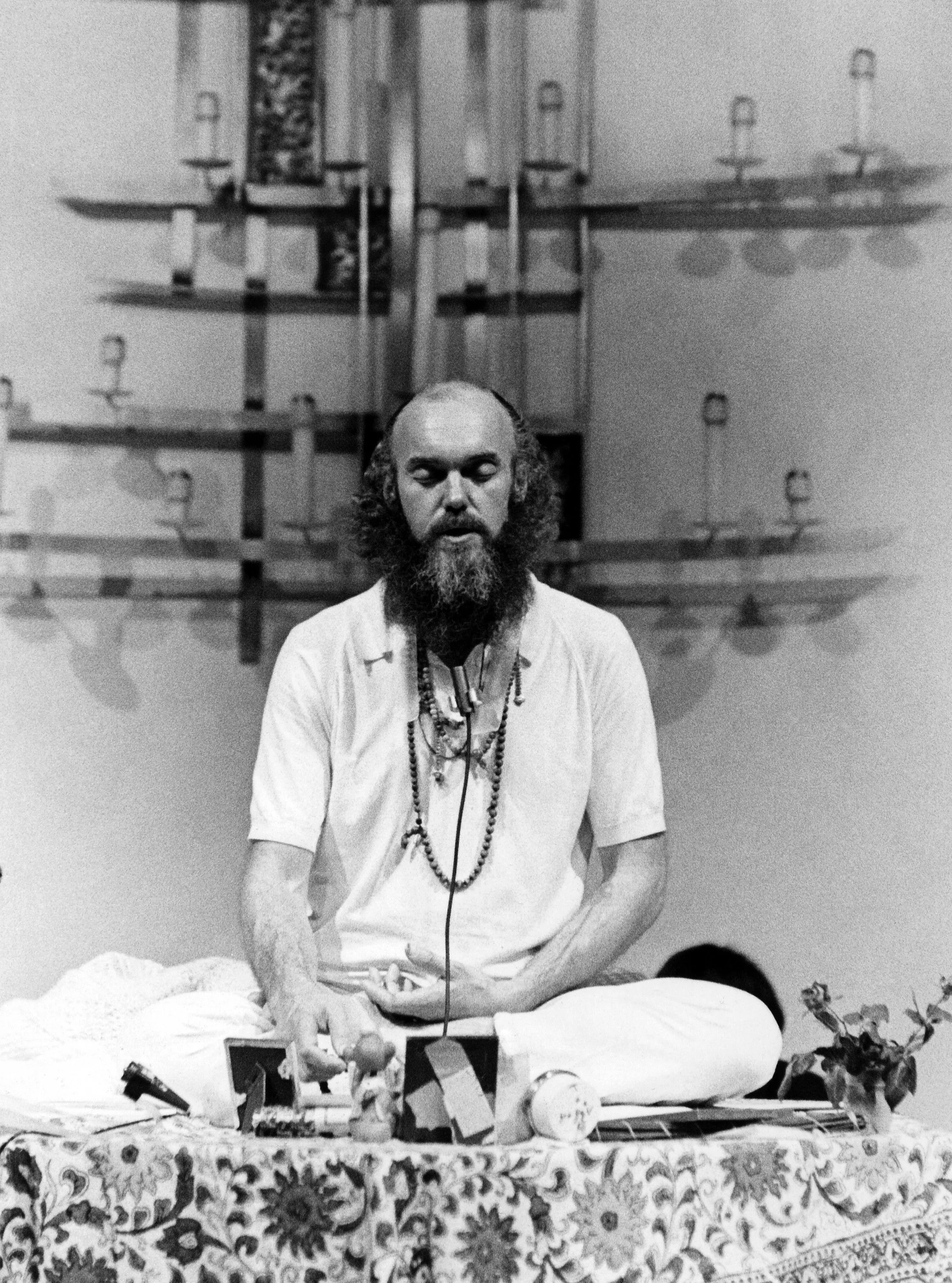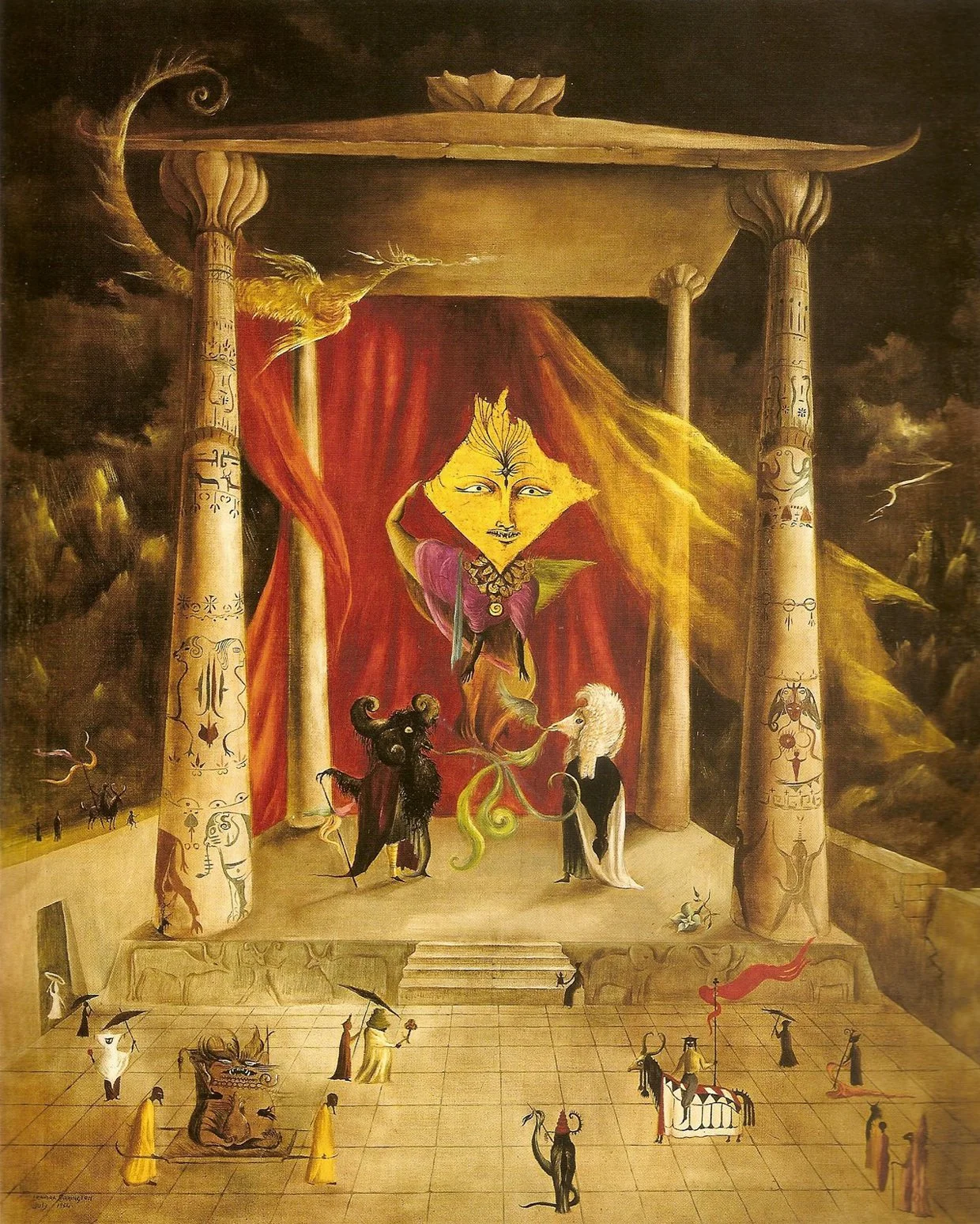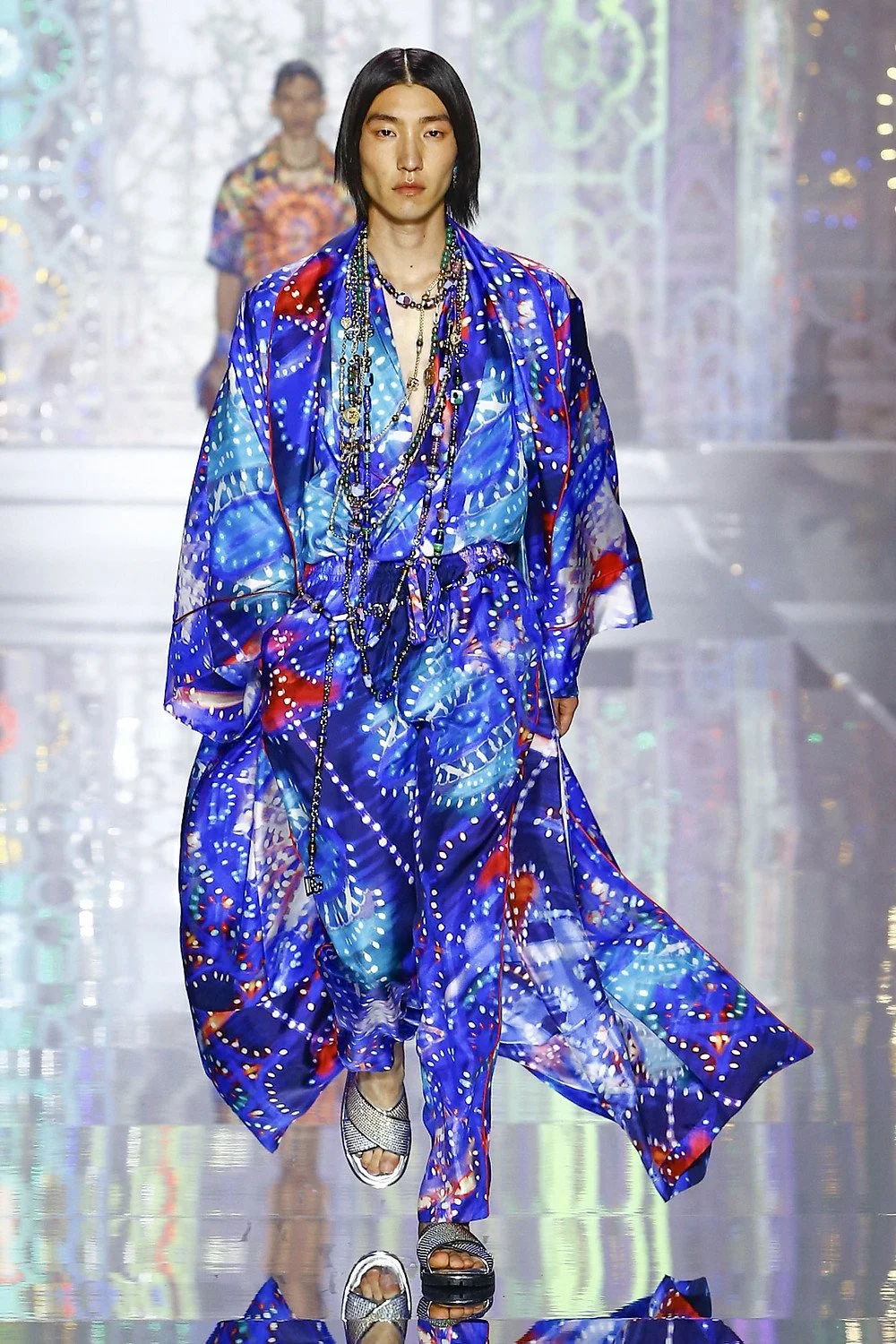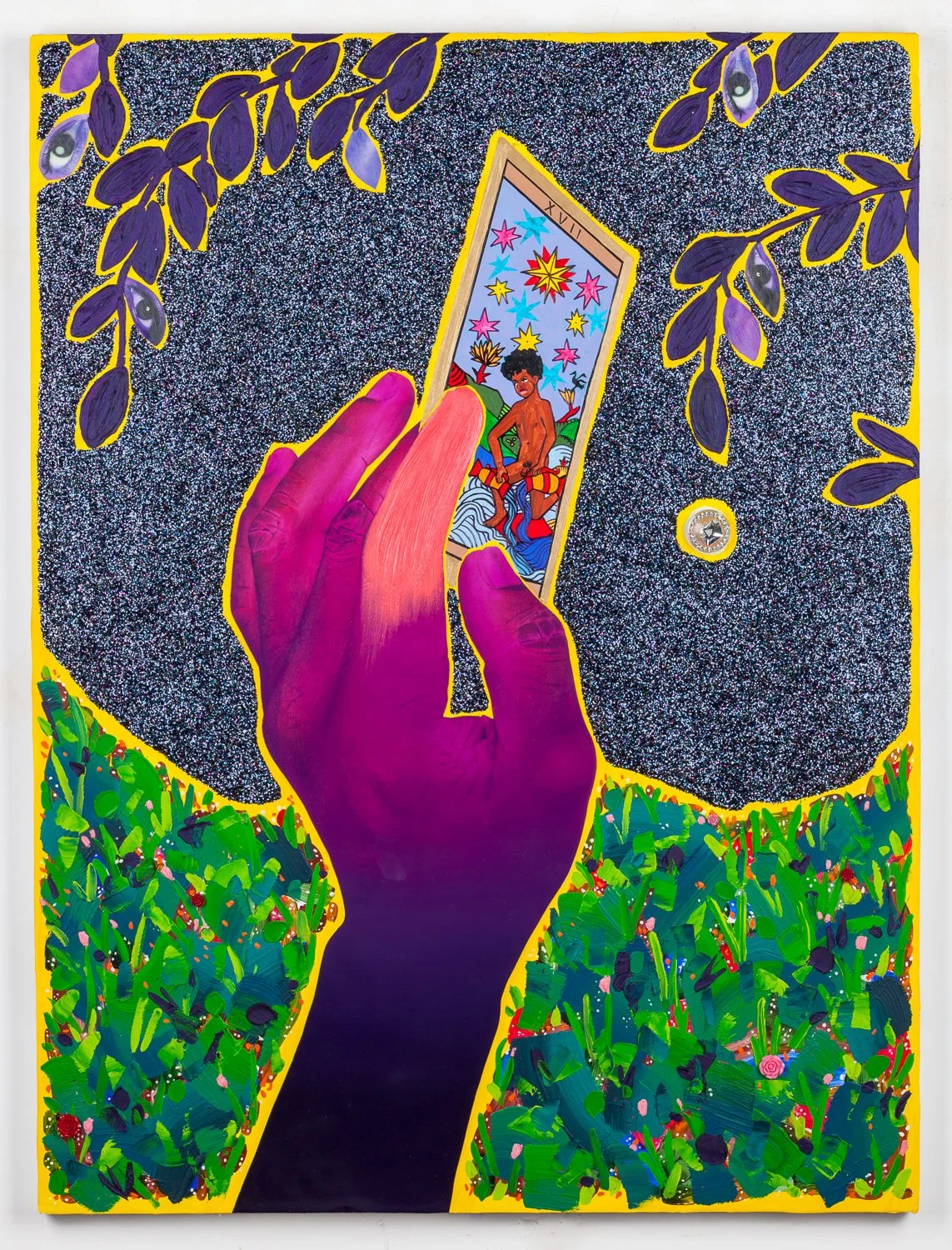Vital Study Zine Week Four: Roll up for the Magical Mystery School
Issue #4: My weekly unofficial Vital Student Zine features observations from the course and beyond
Harvard psychology professor Richard Alpert after he took LSD and remaned himself Ram Dass
Dr Bill Richards is a staple of the modern-day mystery school researching psychedelics. He’s worked alongside Abraham Maslow, Stanislav Grof, Walter Pahnke and more. Now installed at the John Hopkins Centre for Psychedelic and Consciousness Research, he passed trade secrets on to Vital students.
Week four lecturer Dr Bill Richards volunteered for LSD testing as a restless theology student in post-WW2 Germany. He began working alongside Hanscarl Leuner, the German psychologist who invented Guided Affective Imagery (a perverse form of which was used in the brainwashing sequence of A Clockwork Orange), plus added both art and group therapy to LSD tests. Richards went on to become the most prolific psychedelic researcher of all time, working alongside Walter Pahnke, Abraham Maslow, Stanislav Grof, and now Roland Griffiths: he was last out of Spring Grove in 1977, first into the fledgling John Hopkins Centre for Psychedelic and Consciousness Research in 1999, and is still working today. His book Sacred Knowledge: Psychedelics and Religious Experiences is out now.
Thumbnail image: Jane Graverol, ‘L’École de la Vanité’
In the Zine this week, arranged in the synaesthesic schema used for Vital’s cirriculum:
Approach: Wisdom of the Human Mind
Therapy: Healing Power of Laughter
Space: Cosmic Midwifery
Medical: LSD - Did it Ever Go Away?
Integral: The Wrong Mysteries
Plus! Graph/Visual Aid of the Week and second hand books
Approach
The Wisdom of the Human Mind
“I’ve learned to trust how wise the mind is, and how it brings things up the right way, at the right time,” says Dr Richards on the unpredictability of psychedelic experience.
Richards believes his methodist upbringing “saved” him from melting down when left alone in a 1963 testing chamber. His spiritual voyage was considered an intriguing anomaly at the time; other test subjects had indeed mimicked insanity when given LSD in an empty room with zero preparation for what may come.
Schoolin’ around– (L to R) Alan Watts, Allen Ginsberg, Timothy Leary, and Gary Snyder at the Houseboat Summit in 1967
Richards only ever enjoyed one more trip on that level, his fifth, after he and Walter Pahnke devised ‘set and setting’, venturing into nature for the first time.
Richards certainly relishes the mystical aspect now considered key to significant psychedelic healing. Though he advises that “it’s not a dud if it’s not transcendental,” and what arises from the experience is “what needs to.”
Revelation can occur with eyes closed or open, when installed firmly on the couch wearing headphones or roaming through the wilderness… and whether the experience transcendent, farcial, wild, philosophical, relaxing or downright awful.
“This is the growing edge of spiritual development… we must condone knowledge”
The attitude best to prepare the voyager with is one of “courage, adventure, desire for development, and abandonment of personna,” says Richards.
In The Psychology of Money Morgan Housel points out that we all invest money with different reasons, tastes, and circumstances. Then we worry that we’re not doing what the other dude who’s supposedly doing it totally right is doing.
Steve McQueen and Nelie Adams in the steam rooms at Esalen
To some, guiding individuals towards their own neo-shamanic state is glib at best and dangerously foolhardy at worst. But the most experienced western psychedelic therapist of the past sixty years says, “This is the growing edge of spiritual development. The Western World has brought many positive innovations to the experience, and we must condone knowledge.”
Therapy
Healing Power of Laughter
David Shrigley, ‘You are Very Important’
It’s okay to have a chuckle, or a cry, ‘in ceremony’. We could all probably do with one.
“Some patients have an intuitive understanding of the transcendent. Some just giggle,” says Dr Richards.
“For many of us intellectualisation is our primary form of armouring,” continues the seasoned psychedelic therapist, “tell participants to appreciate their thinking minds, but let themselves go out and play. See your patient going through states of wisdom, vulnerability…” and be prepared for pranksterism. The voyager might not be feeling especially mystic today, and that’s their prerogative. “A playful experience may actually be what’s needed,” says Richards. The god of laughter deserves reverence also.
“We are primarily dealing with human consciousness… a meaningful proces unfolding from within”
Reverence is appropriate to tradition, but welcome to the aeon where do what we wilt, not least out of necessity. Fortune favours the brave: the two-guide format, for example, began because researchers couldn’t hold their subject’s hand and change the record on the turntable at the same time. There’s an anecdote that might get you some laughs in over-intellectualising psychedelic circles.
Space
Cosmic Midwifery
Leonora Carrington, ‘The Temple of the Word’
Guides are “like midwives, they create a container” to encourage the voyager’s “own choreography of the experience.”
The guide offers presence, but don’t require reporting. “At a very high dose, we are beyond words anyway,” advises Dr Richards.
Voyagers should be prepped to “dive into the pupil of the monster” lest one pounce from the shadows of their psyche. Challenging experiences are actually quite unusual (only 40% of users say they’ve had one) but “we all have our cross to bear - our trauma” reminds Richards.
“We are primarily dealing with human consciousness,” says Dr Richards, “a meaningful proces unfolding from within.” He says objects, personal or otherwise can be offered to the voyager who appears inquisitive.
“At a very high dose, we are beyond words anyway.”
Guides practising in legally permitted conditions from my study group say music is a fine changer of mood, especially with those who may have difficulty expressing their mystical sides. These “external routes to mystical consciousness” as Richards dubs them, like the classic rose bud or family photo used by silver age guides, can ‘make the energy dance’ like Alfred North Whitehead suggested. Suddenly everything is important, but somehow irrelevant, and both are absolutely fine. Unless they’re not.
“Philosophy is the self-correction by consciousness of its own initial excess of subjectivity,” wrote Whitehead in Process and Reality: An Essay on Cosmology, “[it] may not neglect the multifariousness of the world — the fairies dance, and Christ is nailed to the cross.“ Quite.
Medical
Everything you need to know about this season’s essential LSD revival trend
Dolce & Gabbana men’s spring/summer ‘22 collection catwalk show
The psychedelic renaissance wrote LSD off as impractical, fuddy-duddy, and just so, like long as to be downright subversive. But Sandoz-25 is back in style and the ouroboros eats its tail again.
“To my mind, LSD is the best, the purest” declared Beckley Foundation’s Lady Amanda Fielding at the 2022 Psych Summit held at London’s National Gallery.
After all only the bohemian elite would have the time, right? And time is money more than ever before (usual disclaimers re: existence and/or nature of time). One shudders to think that LSD is the new jetset drug of choice. Beckley are actually conducting the first serious test into microdosing with LSD. The old fave has also found favour with the restless rabble. MindMed’s stage two tests for ADHD are underway at 20µg of LSD per week, hot on the heels of its success with LSD for anxiety. MindMed’s base of Switzerland is the home of LSD after all.
Dolce & Gabbana men’s spring/summer ‘22 collection catwalk show
Meanwhile, Milanese glamour power house Dolce & Gabbana offers the tripwear of choice for sartorial psychonauts in its spring/summer 2022 menswear collection. See you at the sample sale.
Integral
The Wrong Mysteries
‘The Star’ by Devan Shimoyama available here
What is a mystery school? Are we in one now? Should we be? And what are we doing there?
The ‘Mystery School’ is a heartfelt trope amongst some psychedelic users. It evokes not only the acceptance that us ‘remarkable’ former children of ‘unremarkable parents’ (er, Miller 1996) crave, but also a comforting sense of relevance – that we, and not the suits, are actually directing things from behind the scenes. After all, the ‘Illuminati’ pyramid-with-an-eye-on-it which appears on dollar bills was pinched off Martin Luther by the esoteric protestants under England’s Queen Elizabeth the First, hence its shadowy undertones. Cliquiness is unchracteristically intrinsic to psychedelic experience: from the in-crowds at Euleusis and the Platonic Academy through to Esalen and the 21st century Tyringham Initiative, to the “it’s only us tripping” bond between pre-acceptance users and the current impulse to put a gatekeeper on ‘shamanism’.
Students are undertaking ‘Diversity, Inclusion and Cultural Competence Tutoring’ as part of Vital. In the interests of silence being violence, I don’t feel it’s inappropriate for me to experience shame – the actually uncomfortable, ‘only way out is through’ kind – having enjoyed many benefits of multicultural society, let alone colonialism, with none of the drawbacks the people of colour around me faced (you don’t have to agree with that). And if it helps the Vital student body feel safer with, and closer to, each other then it’s a monster I’ll enthusiastically “dive into the pupil of” as Dr Richards puts it. So far this actually seems like it has worked. Which is fantasic.
“For many of us, intellectualisation is our primary form of armouring”
I do try, in my white way, to engage friends in this conversation. They’ll certainly speak about their racial experience in the UK, and sometimes painfully in that deadpan way that makes the aside so much more shocking. But their tales are personal, because it’s a personal conversation. These valuable monologues end with “you know me, Steve, I’m not going to give you the narrative” which is exactly the sort of thing I’d bloody say. Squirming on my part has been met at least once by satisfied laughter and V-signs. This fragile white man will not be given closure via his intellectualised debate, and is sobered instead by the serene sort of first hand testimony that the righteous deliver so gracefully.
Vital brought in next-gen ‘Diversity, Inclusion and Cultural Competence Tutoring’. The lead facilitator was novellist and psychologist Ayize Jama-Everett. He wrote The Entropy of Bones an existential martial arts novel, so had me at that. If you’re reading this Ayize we can nerd out on all this any time here’s my email. Jama-Everett was keen to distance the programme from what we know as ‘diversity training’. His team’s approach is founded in work around differing, unsaid aproaches amongst multicultural communities, which is actually necessary and courageous work.
Obviously there are differences in the American conversation – nobody in US race training mentions the excesses of the Raj, for example. Very few British people of colour descended from slaves; instead they emigrated to post-war Britain, brimming with optimism, to find a war-ravaged, poverty-stricken, tired and grey country that offered little welcome and sometimes outright hostility.
I actually do think that Western society is ‘institutionally racist’ (again you don’t have to agree) and was a bit embarrassed to find out that the approach wasn’t widely accepted. On the flip, I also think that the cultural cometence movement would benefit from communicating using less academic language. Dancing, playing sport and making love together I believe is the best way to begin healing the divides. But even spending meaningful, intimate time together is unlikely to confront the most difficult aspects of the matter. So I commend Jama-Everett for taking it on while admitting the drawbacks of the process, and gladly reward his bravery by taking part in the process despite it involving a challenging process for myself.
Now. Nicholas Spiers, a British expert on western interaction with indigeneous Amazonian peoples also headed up a lecture alongside talismanic thought leader Bia Labate. During a thorough truth-bombing about facile Western framing of Mazatec beliefs he pointed out that Marina Sabina, the shaman banker and mushroom pioneer Gordon Wasson brought to international recognition with his landlmark Life mag feature in the 1960s, had her house burned down by her neighbours for attracting too much police attention to the tradition. She died isolated and poor. Today her image is abused to market tourist traps. Hardly part of any mystery school, or renaissance.
Read more and donate to Bia Labte’s Charcuna charity, intellectualise with Charcuna’s Psychedelic Justice: Toward a Diverse and Equitable Psychedelic Culture or rock this ‘Decolonise Your Mind’ T-shirt at your next gentrified neighbourhood BBQ.
Kool-Aid Corner
To finish: trippy clippings, merry pranks, and psychedelic student life
Graph/visual aid of the Week
The first patent for MDMA
Merck, Germany, 1912
From: The Rave: Spiritual Healing in Modern Western Subcultures by
Scott R Hutson (Anthropological Quarterly, January 2000)
My bookshelf weighs a ton
Notable new purchases for the occult library. Strictly second hand snap-ups only
This week: Strange Ecstasies edited by Michael Parry
£25 usually £100+
Stories of space narcotics by major authors collected by druid of derring-do Michael Parry (d. 2014) , including The New Accelerator by H G Wells, Subjectivity by Norman Spinrad and What to Do Until the Analyst Comes by Frederik Pohl.
Plus a superb cover naturally.
If you like this sort of thing and haven’t read The Employees, a 2020 Booker Prize nominee by Danish author Olga Ravn, a ‘disconcertingly quotidian space opera’ (The Guardian), do so at light speed.
I can’t look at books like this without being hauntd by a sci fi short story about a co-ed college on a space station where the boys get these pets called teasels. I couldn’t find any reference to it online which was chilling in itself.
Next issue: London’s Dr David Luke talks transpersonal psychology and much more
This blog is not affiliated to Vital beyond my study on the course. The content shouldn’t be taken as representative as it’s a personal reflection and includes my own lived experience of the sector too.
Psychedelic drugs are prohibited in the UK, other countries and most US states. I do not condone their use, neither am I evangelising for, or recommending them to you. There are more qualified people you can turn to in the Resources section but if you are considering psychedelic treatments the best person to speak to is probably your own therapist, counsellor, or doctor.
















